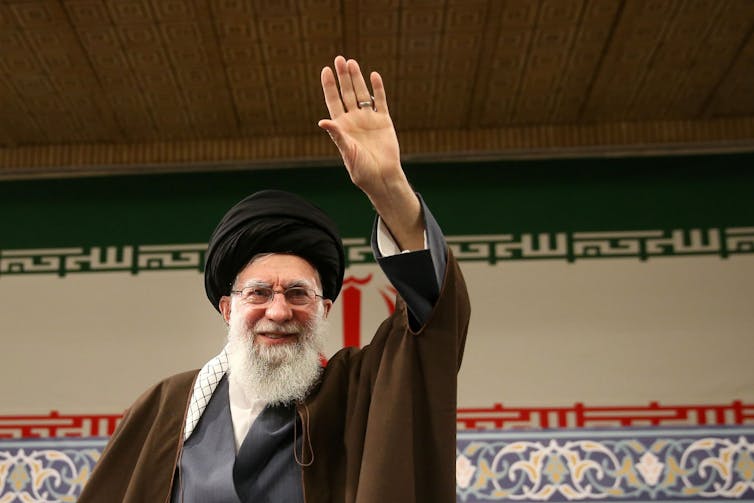HAITI'S FAUX PM
Haiti, Kenya sign agreement on police deployment to tackle gang violenceKenya and Haiti signed a "reciprocal" agreement on Friday to deploy police from the East African country to lead a UN-backed law and order mission to the gang-plagued Caribbean nation, Kenyan President William Ruto said.
01/03/2024 -

Haitian Prime Minister Ariel Henry receives a gift from the Principal Secretary, State department for foreign affairs Dr. Abraham Korir Sing'Oei at a university in Nairobi on March 1, 2024. © Simon Maina, AFP
Ruto said he and Haitian Prime Minister Ariel Henry had "discussed the next steps to enable the fast-tracking of the deployment", but it was not immediately clear whether the agreement would counter a court ruling in January that branded the deployment "illegal".
Haiti's government has pleaded for international help to confront violence that has cost thousands of lives, as armed gangs take over entire swathes of the country, leaving the economy and public health system in tatters.
Read moreGangs in Haiti attack Port au Prince neighbourhood, torching homes
Kenya had previously said that it was ready to provide up to 1,000 personnel, an offer welcomed by the United States and other nations that had ruled out putting their own forces on the ground.
But a Nairobi court said the decision was unconstitutional, in part because the two countries had not signed a reciprocal agreement on the issue.
On Friday, Ruto said he and Henry had "witnessed the signing" of a reciprocal agreement in Kenya's capital Nairobi. Details of the document have not been made public.
"I take this opportunity to reiterate Kenya's commitment to contribute to the success of this multinational mission. We believe this is a historic duty because peace in Haiti is good for the world as a whole," Ruto said in a statement.
The UN Security Council had approved the multinational mission in early October but the Kenyan court ruling threw its future into doubt.
Opposition politician Ekuru Aukot, who had filed the petition against the deployment, told AFP on Friday that he would lodge a case "for contempt of court".
"What is emerging is that William Ruto does not care about the rule of law or the constitution of this country," he said.
"We will question the validity of this secretive agreement."
Ruto said he and Haitian Prime Minister Ariel Henry had "discussed the next steps to enable the fast-tracking of the deployment", but it was not immediately clear whether the agreement would counter a court ruling in January that branded the deployment "illegal".
Haiti's government has pleaded for international help to confront violence that has cost thousands of lives, as armed gangs take over entire swathes of the country, leaving the economy and public health system in tatters.
Read moreGangs in Haiti attack Port au Prince neighbourhood, torching homes
Kenya had previously said that it was ready to provide up to 1,000 personnel, an offer welcomed by the United States and other nations that had ruled out putting their own forces on the ground.
But a Nairobi court said the decision was unconstitutional, in part because the two countries had not signed a reciprocal agreement on the issue.
On Friday, Ruto said he and Henry had "witnessed the signing" of a reciprocal agreement in Kenya's capital Nairobi. Details of the document have not been made public.
"I take this opportunity to reiterate Kenya's commitment to contribute to the success of this multinational mission. We believe this is a historic duty because peace in Haiti is good for the world as a whole," Ruto said in a statement.
The UN Security Council had approved the multinational mission in early October but the Kenyan court ruling threw its future into doubt.
Opposition politician Ekuru Aukot, who had filed the petition against the deployment, told AFP on Friday that he would lodge a case "for contempt of court".
"What is emerging is that William Ruto does not care about the rule of law or the constitution of this country," he said.
"We will question the validity of this secretive agreement."
'A helping hand'
In the face of criticism, Ruto had described the Kenyan undertaking as a "mission for humanity", in step with its long record of contributing to peacekeeping missions abroad.
Haiti, the Western hemisphere's poorest nation, has been in turmoil for years, and the 2021 assassination of President Jovenel Moise plunged the country further into chaos.
No elections have taken place since 2016 and the presidency remains vacant.
Thousands of protesters have demanded Henry's resignation in line with a political deal that required Haiti to hold polls and for him to cede power to newly elected officials by February 7 of this year.
The prime minister, who is on a visit to Nairobi, told an audience of university students on Friday he aimed to "have elections as soon as possible".
"We need elections to stabilise the country," he said, but offered no specific timeframe for the polls.
On Thursday, the Caribbean Community bloc said Henry had agreed to hold elections by 31 August 2025 following a regional summit this week in Guyana.
In January alone, more than 1,100 people were killed, injured or kidnapped in Haiti, according to the UN.
"In October 2022, we asked the world to give us a helping hand. President Ruto was the first one to agree to come to Haiti and we want to say thank you to him," Henry said.
"We thank Kenya for its active solidarity."
The multinational mission – initially approved for one year – had envisioned Kenyan police on the offensive with their Haitian counterparts, who are outnumbered and outgunned by gang members.
Five countries have agreed to join the Kenya-led multinational policing mission, including the Bahamas, Bangladesh, Barbados, Benin and Chad.
Last year saw nearly 5,000 homicides counted in Haiti, more than double the number in 2022, according to a UN report.
(AFP)

















